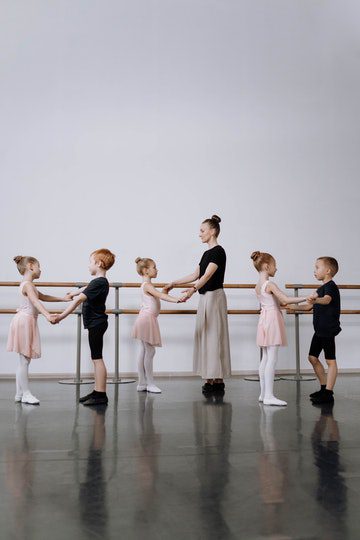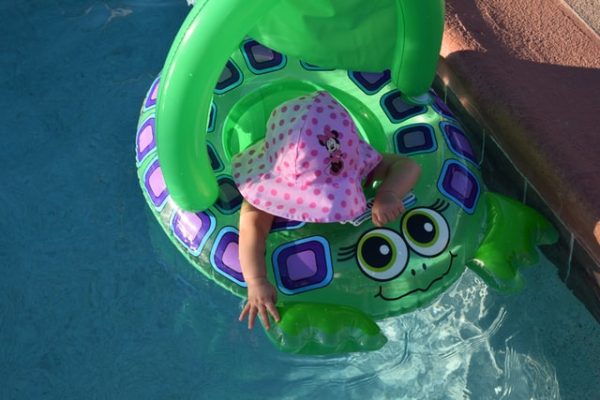A child, to a great degree, becomes what his parents create of him. It all depends on how a parent cares for his child. It can improve children’s social and emotional abilities in some circumstances, and others can turn them on the other side of the coin.
These youngsters develop their decision-making abilities at a young age and grow to become better people. A parent should be competent enough and have control of their child’s behavior. This is to create a confident and dominant nature with your child.
Thus, if you want your kid to learn to swim quickly, you should be able to swim and be confident around water.
A child’s attitude about water begins to form for the first time they are dipped into the water. Their views of the water are shaped by their parents’ behavior when bathing. This affects the baby’s learning pace when they are subsequently exposed to pools or even the bathtub.
As a result, parents should be mindful of their children’s verbal and physical signals when swimming or bathing. Emotions, both good and bad, are equally likely to be passed on to the child. If you are not at ease near the water, you should even use caution so that your child cannot copy, imitate, or react to it. This sensation will become stronger with time and practice, thus allowing your infant to spend more time in the water during swimming classes.
What should you do as a parent?
Parents should show genuine excitement while introducing and exposing their infants to the water for the first time. Take note that the babies’ environment is their parents’, and they will absorb all of their parent’s reactions through external stimuli. Because of this, parents should have a pleasant and calm attitude from the start of each swimming lesson to the end.
The parent’s body language is also essential to the success of the whole process of water familiarization within the baby’s knowledge. The learn-to-swim methods are one of the crucial components in ensuring they have a successful early swim.
Worried parents, however, who clings to their kids or pulls them out of the water conveys a message to their child that the water is a dangerous place for them to go and experience.
Instead, it would be best if you stayed relaxed with the whole swim lesson, with your shoulders at or near the water’s surface, and gently support your child in the water. This promotes the baby’s independence in the water and lets the baby hang onto the water with confidence. If you also want to teach your infants on your own, whether in a bathtub or at the pool, your attitude towards the teaching part becomes the single most important factor.
Where to start?
You may get the most out of the coaching sessions by listening to and comprehending all instructions. You may also ask specific questions about your kid or actively participating in the activities and conversation to gain more knowledge.
A parent should also be enthusiastic about getting wet every time. However, if you do not know how to swim, you will likely be exhibiting a negative emotion to your child that will make him fear the water.
To assist your child in developing his confidence in swimming, try to keep them to a bare minimum. Moreover, most swimming schools do not need active parental engagement, but your involvement may improve your child’s confidence big time.
Lastly, it would be best to show your child that getting into the water is not dangerous to speed up learning.
Tips in helping your baby overcome water worries
Nobody knows their child better than their parents. Children respond more to praise from their parents than to other words. Parents may utilize this to positively reinforce learning by praising their children at every opportunity, from entering the pool to learning swimming.
As a parent, you should praise any new ability that he can do, no matter how small it seems. Also, avoid falling into comparing your child with other children at all costs because your child learns in his unique way than others. Never compare your child to other toddlers who learn quickly.
Remember that you took your child to the water to teach him how to swim and not to embarrass him.
One of the most overlooked elements in child learning is the involvement of the parent. It is critical for a parent to be there and demonstrate the proper method for a child to learn to swim, mainly if the child is under the age of six. It will not only help your kid learn to swim, but it will also improve your bond with your child.
Here are some tips to help your baby overcome water worries.
Make sure your infant is at ease in the water before doing the first swimming lesson.
At first, your child might feel very uneasy in the water. That is why you need to maintain his calm. Your goal is to divert his attention away from the pool long enough for him to remain in the water for a few minutes.
Tell him brief tales or sing to him to distract him from the fact that he is in the water. Assure him that you have him in your possession and that he is secure. These attempts will provide him comfort and trust. The sooner he becomes comfortable in the water, the quicker he will learn.
Every child has its own individual differences
Every toddler learns in their own manner and at their own pace. Your child may be quick at swimming but slow at everything else. You should, as a parent, examine the instructional style critically so that you will know to do it by yourself.
The techniques may not yet be appropriate for him, but you should utilize other different techniques. Determine the best approach for him so that he can learn more quickly.
Do not hinder learning
Children’s inability to meet their parents’ expectations may lead to frequent disappointments and negative emotions that will induce fear of the child from the water. Children are susceptible to their parent’s facial expressions, and it is assured that they are very aware of this. This might stimulate them to reverse the learning process.
To prevent this scenario, use a simple principle like putting yourself in your child’s shoes. Reduce your expectations and be practical.
One step at a time
Even though parents sometimes are terrible at swimming, we still understand what it means to swim. We may learn quickly and even skip certain stages. However, this cannot be expected of a child who has never been in a swimming pool.
Allow him to learn one step at a time and master it before moving on to the next level. Do not rush because he needs to be emotionally and physically prepared to go through the next level.
Maintain your cool
The pace at which your kid is learning may annoy you sometimes, and you can become easily irritated. Please be patient, my dear parent. Do not go above the limit.
Maintain your calm when your infant engages in undesirable behaviors. If your infant witnesses you losing your grounds daily, he might fear going to the water and lose interest in swimming. And that will be a backlash for you as a parent.
Be prepared
Always be attentive and professional. Lear and follow all of the directions. Never skip a specific process. Even if your child has a teacher, you should be the first role model he looks up to.
Your child will be seeking your signals and instructions. Keep this in mind. Always know that babies will first attempt to learn by observing. Be organized, disciplined, and truthful. Allow your child to watch and learn from you.
Before you attend, be sure to be well prepared, have swim nappies, towels, etc at the ready. Check out this pre-swimming checklist for more tips
Recognize each accomplishment
Every little step, from entering the pool for the first time to his first stroke, is a significant step forward in the child’s learning process.
Remember to recognize these events without fail. This will boost the child’s self-confidence and self-esteem. Tell him that he is doing good and he’ll surely understand and be happy about it.
Swimming lessons are a great way to socialize
Introduce your child to other children. He will have established a bond between them, and he will want to follow them too. Make it a point for them to learn together if possible.
This will increase the amount of enjoyment and speed up the learning process. However, don’t allow the competitiveness to get out of hand.
You may include your family members in swimming classes as much as possible. This will make learning more enjoyable. This will help improve the connection between all family members and the child.
Trust is the key
Avoid any wrongdoings, such as unexpected actions or tossing him into the water. It will generate mistrust between you and your child.
Prepare him thoroughly before each swimming lesson. Maintain his faith, and he will reward you with trust by learning what you are teaching to him.






























































